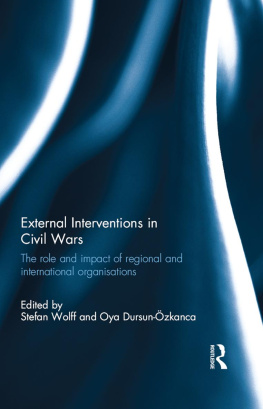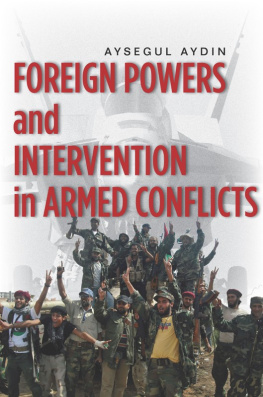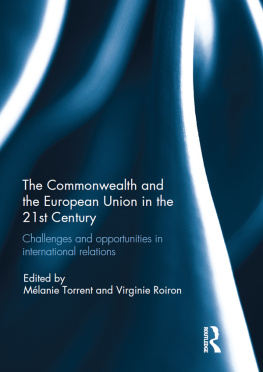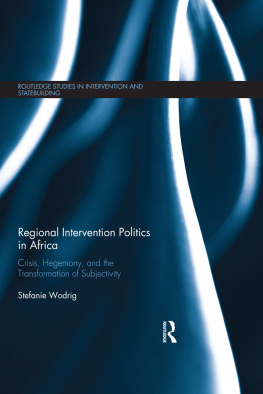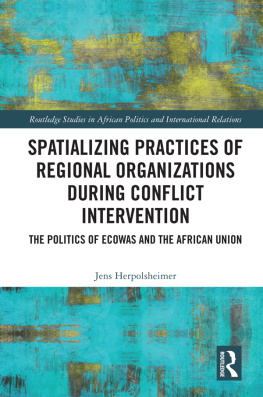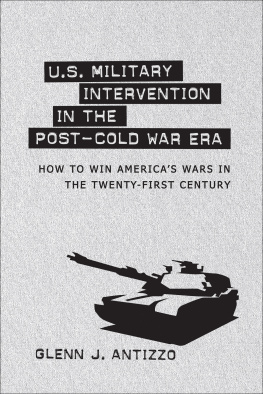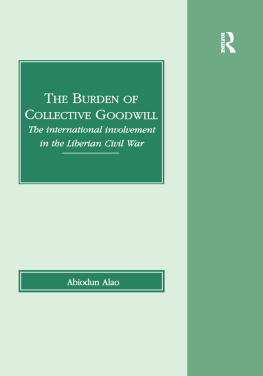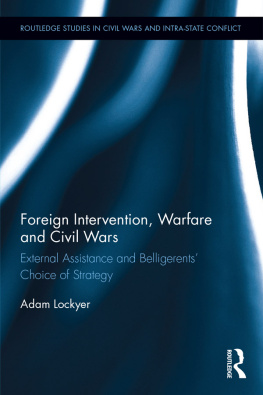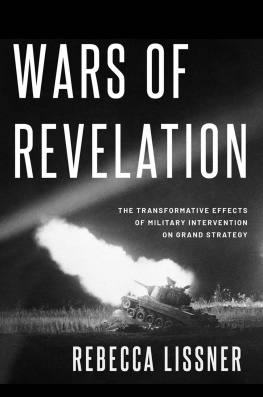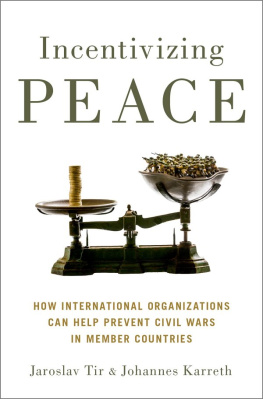External Interventions in Civil Wars
This volume brings together expert case studies on a range of experiences of third-party interventions in civil wars. The chapters consider the roles of a variety of organisations, including the United Nations, NATO, the European Union, the Shanghai Cooperation Organisation, the Organisation of the Islamic Conference, the African Union, and the Organization of American States.
Each case study features a presentation and analysis of empirical data in two dimensions: the organisations general capabilities to carry out intervention in civil wars and, specific to one particular intervention, the conflict context in which it happened. This serves two purposes. First, to offer insights into the dynamics of each individual case and helping us understand the specific outcome of an intervention effort, i.e., why did a mission (partially) succeed or fail. Second, it enables us to make real comparisons between the cases and draw policy-relevant conclusions about the conditions under which military, civilian and hybrid intervention missions are likely to succeed.
This book was published as a special issue of Civil Wars.
Stefan Wolff is Professor of International Security at the University of Birmingham, UK, and an expert and consultant on conflict management to several governments and international organisations.
Oya Dursun-zkanca is an Associate Professor of Political Science at Elizabethtown College, USA. Her research interests include transatlantic security, Security Sector Reform, and peace-building.
External Interventions in Civil Wars
The role and impact of regional and international organisations
Edited by
Stefan Wolff and Oya Dursun-zkanca
First published 2014
by Routledge
2 Park Square, Milton Park, Abingdon, Oxon, OX14 4RN
Simultaneously published in the USA and Canada
by Routledge
711 Third Avenue, New York, NY 10017
Routledge is an imprint of the Taylor & Francis Group, an informa business
2014 Taylor & Francis
All rights reserved. No part of this book may be reprinted or reproduced or utilised in any form or by any electronic, mechanical, or other means, now known or hereafter invented, including photocopying and recording, or in any information storage or retrieval system, without permission in writing from the publishers.
Trademark notice: Product or corporate names may be trademarks or registered trademarks, and are used only for identification and explanation without intent to infringe.
British Library Cataloguing in Publication Data
A catalogue record for this book is available from the British Library
ISBN13: 978-0-415-71144-9
Typeset in Times New Roman
by Taylor & Francis Books
Publishers Note
The publisher accepts responsibility for any inconsistencies that may have arisen during the conversion of this book from journal articles to book chapters, namely the possible inclusion of journal terminology.
Disclaimer
Every effort has been made to contact copyright holders for their permission to reprint material in this book. The publishers would be grateful to hear from any copyright holder who is not here acknowledged and will undertake to rectify any errors or omissions in future editions of this book.
Contents
Stefan Wolff and Oya Dursun-zkanca
Darya Pushkina and Philip Maier
James Sperling and Mark Webber
Annemarie Peen Rodt
Alpaslan zerdem
Annemarie Peen Rodt and Stefan Wolff
Heather Smith-Cannoy
Stephen Aris
The chapters in this book were originally published in Civil Wars, volume 14, issue 3 (September 2012). When citing this material, please use the original page numbering for each article, as follows:
Chapter 1
Regional and International Conflict Regulation: Diplomatic, Economic and Military Interventions
Stefan Wolff and Oya Dursun-zkanca
Civil Wars, volume 14, issue 3 (September 2012) pp. 297-323
Chapter 2
United Nations Peacekeeping in Timor-Leste
Darya Pushkina and Philip Maier
Civil Wars, volume 14, issue 3 (September 2012) pp. 324-343
Chapter 3
NATOs Intervention in the Afghan Civil War
James Sperling and Mark Webber
Civil Wars, volume 14, issue 3 (September 2012) pp. 344-372
Chapter 4
The African Union Mission in Burundi
Annemarie Peen Rodt
Civil Wars, volume 14, issue 3 (September 2012) pp. 373-392
Chapter 5
The Contribution of the Organisation of the Islamic Conference to the Peace Process in Mindanao
Alpaslan zerdem
Civil Wars, volume 14, issue 3 (September 2012) pp. 393-413
Chapter 6
European Union Conflict Management in the Western Balkans
Annemarie Peen Rodt and Stefan Wolff
Civil Wars, volume 14, issue 3 (September 2012) pp. 414-430
Chapter 7
Defending Democracy? Assessing the OASs 2002 Diplomatic Intervention in Haiti
Heather Smith-Cannoy
Civil Wars, volume 14, issue 3 (September 2012) pp. 431-450
Chapter 8
The Response of the Shanghai Cooperation Organisation to the Crisis in Kyrgyzstan
Stephen Aris
Civil Wars, volume 14, issue 3 (September 2012) pp. 451-476
Please direct any queries you may have about the citations to clsuk.permissions@cengage.com
STEFAN WOLFF AND OYA DURSUN-ZKANCA
There is considerable case-specific and anecdotal evidence of the impact of international organisations in conflict regulation, but conceptual frameworks and systematic comparative research are lacking. We begin by categorising different strategies of regional and international conflict regulation and then offer one possible macro-framework to account for its success or failure. This framework combines a focus on factors internal to the relevant organisation (i.e. its capabilities to act, fund and coordinate and cooperate) with an analysis of the conflict context (at the local, state, regional and global level). We find six factors to be particularly important: availability of resources and willingness to deploy them to strategic effect, commonality of interest among member states or a lead nation/s, long-term and continuously sustained conflict regulation efforts rather than ad hoc/on and off crisis management, effective external cooperation with major partners, a permissive conflict context and local interest in ending rather than continuing the conflict.
INTRODUCTION
The international community defined as international and regional organisations, as well as their (powerful) member states has a deeply ambivalent attitude towards tackling the complexity of frequently internationalised intra-state conflicts and their dynamic, partially causal and partially consequential, relationship with (incomplete) democratisation processes, growing concerns about the economic viability of conflict-torn states and their potential successors, and an ever-increasing presence of transnational organised crime networks with significant reach beyond their country and region of origin. Perhaps, this is nowhere more apparent at present than in relation to Arab Spring. From the more-or-less enthusiastic military intervention in Libya to the reluctance of becoming drawn more deeply into the evolving conflict in Yemen, the wait-and-see policy in the case of Syria, and outright rejection of support for the pro-democracy movement in Bahrain, the United Nations (UN), regional organisations and their individual member states offer anything but a coherent strategy on how to deal with the humanitarian and security challenges presented by the unrest that has engulfed large parts of the Middle East and North Africa since the beginning of 2011. Even where it seems at its most decisive, international intervention is far from it: at the time of writing in September 2011, the military campaign to protect Libyan civilians has been ongoing for more than four months. Even though the Gaddafi regime has been ousted, the medium- and long-term implications of the intervention remain uncertain.

